Cover Story
From hawker to flying high
Juneyao Airlines chairman Wang Junjin and his two brothers started their working lives as roadside hawkers. The clever trio rode China’s economic wave and along the way the business of aviation caught their eye. Aerospace is now part of the Juneyao conglomerate with middle brother Junjin running a full service carrier that is one of the fastest growing airlines in China.
November 1st 2016
Juneyao Group chairman and owner of Shanghai’s Juneyao Airlines, Wang Junjin, started his working life as a teenage hawker of milk and yoghurt, alongside his two brothers, in the poor fishing village of Dayuzhen in Zhejiang province. Read More » Today, the 47-year-old entrepreneur is ranked 180th on China’s Rich List and the Juneyao Group he leads is ranked 177th on the China Top 500 Companies List.
Junjin and his brothers, Junyao and Junhao, were always determined to move to the big city. Junyao, the eldest of the three, dropped out of school to become a hawker. His brothers soon joined him and set off on their path to a better life.
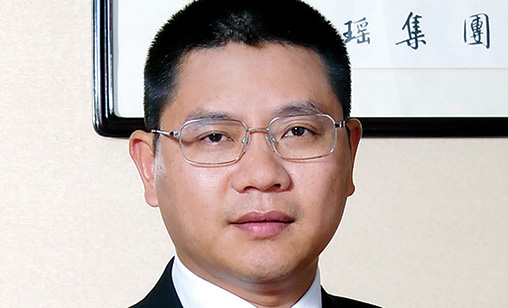 |
| 'We’ve also been cooperating with China Eastern for a long time. It’s a mutual relationship, but we’re in talks with many airlines about how we could move forward by working together' |
| Wang Junjin Chairman Juneyao Airlines |
After they arrived in Shanghai, where they continued to peddle dairy products, they expanded their offerings to stickers, badges and flags as the 1990 Asian Games in Beijing approached. It was the first time the Games were to be held in China and the clever young trio fed pent-up demand for patriotic souvenirs in a market with little competition. The enterprise made the Wangs their first million.
“Sleeping over a dozen hours under the bench on trains was a common thing,” Wang told Orient Aviation in Shanghai last month, as he revealed how the brothers built their businesses.
In 1991, they founded the Juneyao Group in Wenzhou. On July 28 of that year, as an Antonov An-24 touched down in Wenzhou, they made their first foray into aviation—China’s first business jet charter company.
Juneyao transported entrepreneurs, business associates and anyone who could afford it on their business jet. The first services were between Wenzhou and Changsha followed quickly by flights to other domestic Mainland destinations. In typical Chinese fashion, the brothers expanded their empire at breakneck speed by investing in real estate, financial services (including their own bank), retail and commerce subsidiaries and, of course, dairy products.
“In the past three decades, since China launched its reform and opening up policy, the Juneyao Group has benefited from the government’s preferential policies to encourage private undertakings. As private company owners, we are not solely relying on ourselves to achieve success. We happen to have been born at the right time, “ said Wang.
“If not for the great tide of reform and opening up, which awoke the entrepreneurial spirit hidden in our hearts, I might still be an honest fisherman like people in my father’s generation.” Fortune has been favourable to their labours, the Wangs believe. They are firm believers in corporate social responsibility and fund charities including a poverty alleviation programme for migrants in the Three Gorges Dam area.
Sadly, the eldest brother of the trio, Junyao, has not lived to enjoy the success of the Juneyao Group. He died of cancer in 2004 , aged 38, after he bequeathed the group’s chair to Junjin and the vice-chair to Junhao, the youngest of the siblings.
Juneyao Airlines was officially established a year later, although the carrier’s maiden flight did not take off from its Shanghai Hongqiao base until 2006.
Juneyao Group has more than 10,000 employees. It listed on the Shanghai Stock Exchange in May 2015 for US$1 billion. Junjin’s estimated $1.42 billion fortune includes 26% of the group’s airline and 14% of listed department store group, the Wuxi Commercial Mansion Grand Orient Co. Wang Junyao’s bachelor son, 28-year-old Wang Han, was left 27% of Juneyao Airlines by his late father.
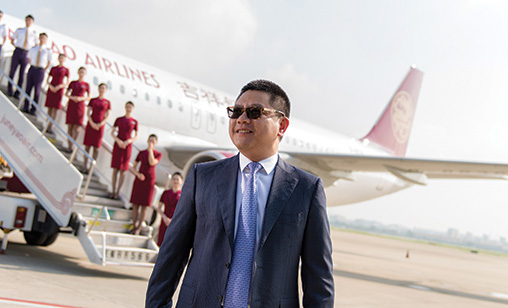 |
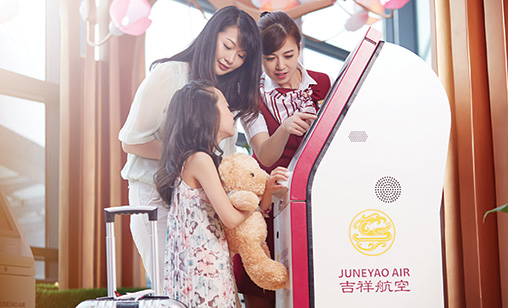 |
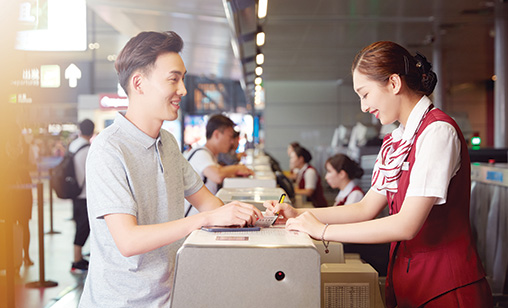 |
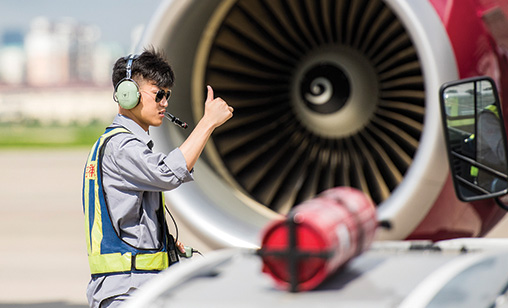 |
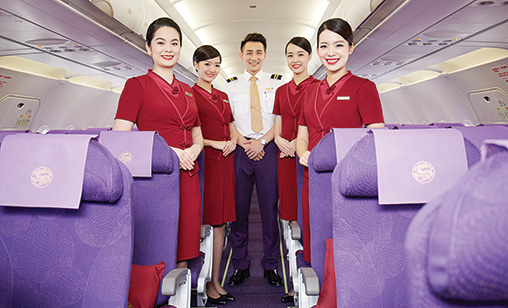 |
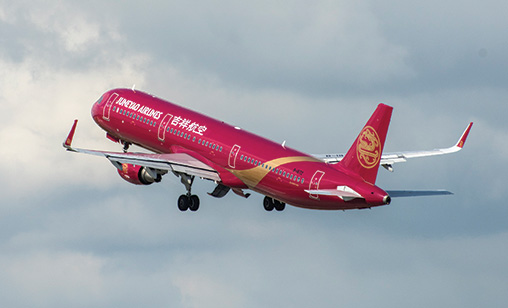 |
Wang said he always knew that if his airline was to succeed, it would have to be a different product in the market. It must have a reputation for quality that set it apart from the Big Three state-controlled carriers.
“Competitiveness is very important for private companies like us if we want to win a share in the aviation market. We have been focusing on quality services to improve our competitiveness. For instance, we’ve installed more comfortable seats on our planes with more leg room.” he said.
“In aviation in China today, there is a lot of room for airlines to improve the quality of their services, for example on-time flight performance. We pay attention to details that others often neglect. In this way, we are maintaining above average service.”
Juneyao Airlines is determined to be different. It has developed a solid reputation with Mainland business and leisure travellers alike. The airline likes to call itself a “high-value carrier”. It invests up to 20% more on in-flight meals and beverages than the Big Three airlines.
And it works. When your Orient Aviation correspondent took a Juneyao flight from Shanghai to Hong Kong following this interview, the service included a bilingual menu with a choice of Chinese or Western cuisine. Neither meal choice nor bilingual menus are available on your average chinese legacy carrier flight.
Wang said Juneyao allows its passengers to check in late when a flight is delayed, and will inform drivers, through SMS, of its registered business passengers’ arrival to make sure they are boarded as soon as their flight has landed.
After flying for two years out of Hongqiao, Juneyao opened a second base at Shanghai Pudong to avoid congestion at smaller, downtown Hongqiao. In 2015, it held 8.65% of the market at the two airports, putting it ahead of flag carrier, Air China. It is the third largest airline in the city after China Eastern Airlines and China Southern Airlines.
In its first year, Juneyao Airlines flew three GECAS-leased A320 Family aircraft on five domestic routes. Its Airbus fleet doubled in the second year, then grew to 17 aircraft in 2010, 30 in 2012 and 50 in 2015. At the end of 2016, it expects to have 41 A320s and 16 A321s, which will make it the airline with the youngest fleet in China, with its planes averaging 3.8 years in age.
Until now, Juneyao has stayed loyal to Airbus, but this could change when it launches long-haul operations to Australia, the U.S. and Europe from 2020. Wang said the airline is considering the A350 and the B787 for its long-haul expansion, with an announcement due before the end of the year. As for the A380, the chairman said Juneyao “will not consider this based on efficiency and economic considerations”.
If the posters lining the walls of Juneyao’s headquarters at Hongqiao are an indication of its fleet planning, the B787 appears to have a good shot at breaking Airbus’ monopoly at the carrier. Boeing has definitely done its Chinese homework, as carrier after carrier orders the Dreamliner. Earlier this year, Kunming-based Ruili Airlines celebrated its second anniversary by firming an order for six -9s and a few weeks later Shenzhen start-up, Donghai Airlines, ordered five B787s. HNA Group’s Lucky Air will receive -9s as China’s first long-haul low-cost carrier (LCC), operating out of Kunming, with a secondary base planned from 2020 at Chengdu’s under construction Tianfu International airport.
Wang said Juneyao wanted to start with ten widebodies, but he stopped short of listing their inaugural destinations. As the airline continues to strengthen its ties with Star Alliance, it would be logical for Juneyao to feed into the alliance’s hubs at Frankfurt, Chicago, San Francisco and Vancouver. Wang has ruled out purchasing the “Made in China” ARJ21. He said the regional jet was designed to fly 70-80 passengers on short hops and was too small for Juneyao given its Shanghai base.
Juneyao’s passenger numbers have grown at an average annual rate of 19.1%, with 10.5 million passengers boarded last year. Its operation is heavily focused on its Shanghai hubs with 88.2% of its passengers handled at the two airports. In 2015, passenger numbers grew 29.7% year-on-year, with domestic growth of 28.72% and international expansion of 61.33%. Like many of its Mainland rivals, it lost ground in Hong Kong, Macau and Taiwan, with an 18.55% decline in passengers carried.
The airline has been in the black for the last decade. In 2015, Juneyao reported a net profit 1.05 billion yuan (US$162 million). As of June 30, its net profit was 706 million yuan, a 41% year-on-year improvement. It was achieved on revenue of 4.75 billion yuan against four billion yuan in costs. Juneyao Airlines’ total assets are $2.9 billion yuan against $1.7 billion yuan in liabilities.
The airline serves 69 destinations: 51 in Mainland China, 14 international destinations, as well as “the regions” of Hong Kong, Macau, Taipei and Kaohsiung. It has a particularly strong presence in Thailand, with multiple daily flights from Shanghai to Bangkok, Phuket, Chiang Mai and Krabi. Following a relaxation of visa policy in January 2015, Japan also sees Juneyao flights at Tokyo Haneda, Osaka, Nagoya, Fukuoka, Tottori, Obihiro and Okinawa.
Earlier this year, the carrier launched a thrice-weekly Pudong-Irkutsk service, its longest route to date. It then added a daily Chengdu-Krabi service and Nanjing-Okinawa flights, which signalled a move away from its traditional hubs.
Juneyao is often mistaken for a budget airline. Nothing could be further from the truth, said the “high-value carrier”. It is “cost-efficient”, but it re-emphasised it spends more on in-flight offerings than its competitors.
The Wangs are nonetheless well aware of China’s LCC potential. As early as 2006, Juneyao Group purchased a 71% equity in Okay Airways’ largest shareholder, Beijing Okay Investment Co, and obtained a 45% indirect holding in the Tianjin-based LCC. Four years later, Juneyao sold its shares in Okay Airways to DTW Group, for 200 million yuan, after reported disputes with the LCC’s minority owners.
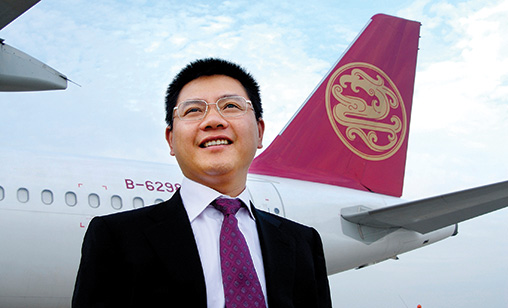 |
Wang cemented his commitment to the budget sector by founding Jiuyuan Airlines—variously branded “9 Air” or “nine yuan” for its lowest airfare—in Guangzhou in December 2014. The setting up of the airline followed closely on the heels of Beijing’s advocacy for more LCCs, following the success of privately-owned Spring Airlines, also headquartered at Hongqiao.
Jiuyuan got off to a rocky start after missing out on the good slots at Guangzhou Baiyun, which delayed its launch and stunted its initial growth. The LCC now flies 16 domestic routes to 11 cities on ten B737-800s. it has some “tag” routes departing from Guangzhou before 7am for multiple stops before returning to the Pearl River Delta after midnight.
The LCC has an order backlog with Boeing for 20 B737-800s and 30 B737 MAXs. Wang hoped it would break even by year-end. Juneyao and Jiuyuan do not codeshare or interline due to IT integration issues.
After three years of negotiations, at the urging of Air China, Juneyao has announced it would join Star Alliance as a connecting partner early in 2017. “This tie-up allows us to achieve our goals, lower our costs and provide more services to our passengers,” Wang said.
While he did not spell out the costs of joining Star, the Juneyao boss said he would wait to see how the partnership with Star develops before he decides to become a full-fledged member of the alliance. “We have weighed in on which alliance would be better for us. We have decided to sign a memorandum with Star Alliance because costs are lower, their business is more aligned with ours and it’s more efficient,” Wang said.
Wherever its allegiance may lie, Juneyao will continue its codeshare partnership with fellow Shanghai carrier and SkyTeam member, China Eastern Airlines. “We decided to do this for the benefit of the traveller and not for our business. We’re open to collaboration with any airline, specifically any airline that flies to Shanghai, as long as it can bring convenience for the traveller,” he said.
In the meantime, “we offer 53 additional routes that will complement Star Alliance’s existing services from Shanghai and will no doubt attract more connecting passengers to our two home hub airports”, he said.
“We’ve also been cooperating with China Eastern for a long time,” Wang emphasised. “It’s a mutual relationship, but we’re in talks with many airlines about how we could move forward by working together.”
In particular, Wang mentioned Air New Zealand and Air Canada. The latter is preparing to launch a daily Montreal-Pudong service in February, complementing its existing daily flights to Toronto and Vancouver.
Wang is regarded as an unassuming, hands-on leader, ever committed to his family conglomerate and the airline. “Wang’s extraordinary courage and insight together with other entrepreneurs in China with pioneering spirits might lead China’s private economy to take off,” the New York Times said back in the early 2000s.
Sure enough, the economy took off and so did the Wangs and their Juneyao Group. The group can lay claim to be one of the first private aviation pioneers in the nation. It broke through the bureaucracy of state ownership and tight regulation and is delivering a consumer-centric experience to the Chinese air passenger.
| Committed to safety Safety remains the top priority at Juneyao. The airline has a good record and passed the International Air Transport Association Operational Safety Audit (IOSA) in July 2009. The decade has only seen one minor incident at the carrier, albeit with wide-ranging consequences. In 2011, the South Korean pilot of Juneyao Flight 1112 out of Shenzhen disregarded six consecutive orders from Hongqiao Air Traffic Control in seven minutes to abort his approach, after another incoming aircraft had declared a fuel emergency. The Civil Aviation Administration of China (CAAC) permanently revoked the pilot’s license and temporarily suspended Juneyao from recruiting foreign flight crew after imposing a 10% capacity curb on the carrier for three months. It also ordered Juneyao to conduct at least 40 hours of ground theoretical training courses for its foreign pilots within a month of the incident. Juneyao has since returned to the CAAC’s good books. Foreign pilots make up approximately 15% of its flight deck crew, with the majority of them recruited from South Korea and Mexico. Juneyao has pilot pay packages of up $300,000 for an A320 captain, according to postings at ASSA, a Hong Kong-based pilot recruiter. The airline employs a fair number of female flight deck crew, a progressive approached for a Mainland carrier. |
Mia Brown says:
November 21st 2020 11:08pm